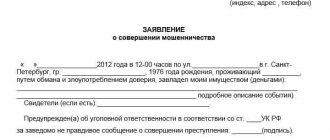One of the options for countering violations by police officers is to file a complaint with the prosecutor’s office about the inaction of police officers. Representatives of the Ministry of Internal Affairs must behave appropriately, comply with the law and stand guard over it.
Often this rule is violated. At the same time, it often happens that the actions of the guardians of law and order go against the law. As a result, citizens suffer.
It must be said that it is always necessary to respond to inappropriate behavior of employees. Since, this will contribute to the speedy eradication from the law enforcement system of various elements that make it vulnerable and inconsistent with the constitutional order.
Where to complain about the police: requirements for the content of the statement that you cannot do without
So, how to properly write a complaint about unlawful actions of police officers?
Preparing and drawing up an application requires extreme care from a person.
First of all, it is necessary to find out all the possible options for the development of events. And you need to start by deciding where exactly to complain.
So, citizens can express their complaints to several bodies that have supervisory functions over police officers.
These include:
- Initially, the employee's superiors should be mentioned whose actions or inactions led to this situation.
- A complaint about the inaction of the police on duty can be sent to the OSB (internal security department).
- Citizens can also express their complaints to the prosecutor's office.
Expert commentary
Roslyakov Oleg Vladimirovich
Lawyer, specialization civil law. More than 19 years of experience.
It is difficult to say which action will be the most relevant and will bring the fastest result. To do this, you need to be aware of the specific situation. It is best to consult a lawyer here. However, our article will focus on the cases that have already been listed above.
Appeal procedure
If a citizen directly contacts the Prosecutor General's Office, his complaint may be returned without consideration. In this case, a recommendation will be given to try to resolve the situation without the intervention of the supervisory authority. An exception is only possible if it is a serious offence.
To ensure that the supervisory authority does not refuse to accept the document, it is better to follow this algorithm:
- Contact the immediate supervisor of the police officer. It is better to draw up the document in writing, since in this case it is possible to verify that it is registered and accepted for consideration. The application can be presented to the manager during a personal reception, transmitted through the office or sent by mail. The response must be provided to the applicant within 30 days.
- If the manager did not satisfy the citizen’s demands and did not punish the violator, you can complain to the personnel inspection. It is important to clearly formulate the requirements in the document and indicate your intention to seek help from the prosecutor’s office. In most cases, this is enough for police management to decide to look into the situation.
- If the problem cannot be resolved without the intervention of the supervisory authority, you will have to submit an application to the prosecutor's office. First, the document should be sent to your territorial unit. It must state all the circumstances of the incident, formulate the requirements and indicate where the citizen previously applied. Copies of previously received responses and other documents confirming the fact of violation of the law should be attached to the appeal. The last authority where a citizen can turn is the Prosecutor General's Office.
In most cases, citizens complain about the inaction of the police.
The most common police violations
In order to understand the question of where exactly it is better to complain about the police, it is necessary to consider their most common actions or inactions.
Among them it is necessary to highlight such:
- Exceeding authority is basically making illegal demands.
- Actions as a result of which the rights of citizens were grossly violated - groundless detention, beatings.
- Inaction, that is, the lack of response from the authorities to calls for help, evasion of their duties, incompetence.
- Extortion of a bribe.
Some of these cases need to be further disclosed. Because they hide many different options.
First of all, we need to talk about police inaction. Of course, negligence must be considered in the context of a specific case, but, as a rule, this requires a complaint to the prosecutor's office about the inaction of police officers.
Again, only a lawyer can correctly qualify acts committed by law enforcement officers. So it’s still better to contact a law firm.
We recommend! Private complaint against a court ruling in a civil case: procedure for filing and consideration + sample private complaint
Lysvensky city district official website
12/30/2020 A complaint against the actions of a police officer can be sent either to his supervisor, the head of a unit (department, office, etc.), or the chief of police, as well as the head of the internal affairs agency in which the police officer serves. A complaint can also be sent to the head of a higher internal affairs body.
Appealing the actions (decisions) of a police officer to a prosecutor involves sending a complaint to the supervising prosecutor, that is, as a rule (if we are not talking about the police of specialized internal affairs bodies), the prosecutor of the same administrative-territorial entity or a higher prosecutor.
Appeals against the actions (decisions, inactions) of a police officer in court are carried out through criminal or civil proceedings. The procedure for filing a complaint with the court against the actions (decisions) of the investigator (inquiry agency, head of the inquiry agency), as well as the judicial procedure for considering complaints in criminal proceedings is regulated by Art. 125 Code of Criminal Procedure of the Russian Federation.
Resolutions of the investigator (inquiry body, head of the inquiry body) to refuse to initiate a criminal case, to terminate a criminal case, as well as other decisions and actions (inactions) that can cause damage to the constitutional rights and freedoms of participants in criminal proceedings or impede citizens’ access to justice , are appealed to the court at the place where the preliminary investigation was conducted.
Other decisions and actions of the investigator (inquiry agency, head of the inquiry agency) that can cause damage to the constitutional rights and freedoms of participants in criminal proceedings or impede citizens’ access to justice should at a minimum include detention in accordance with Art. Art. 91 and 92 of the Code of Criminal Procedure of the Russian Federation, initiation of a criminal case.
In accordance with Art. 9 of the International Covenant on Civil and Political Rights of 1966, the norms of which, by virtue of Part 4 of Art. 15 of the Constitution of the Russian Federation are an integral part of the legal system of the Russian Federation and have supremacy over its internal legislation, everyone who is deprived of liberty as a result of arrest or detention has the right to have his case heard in court, so that this court can immediately rule on the legality of his detention and order his release if the detention is unlawful.
Based on this, the complaint of a person detained on suspicion of committing a crime, his defense attorney or legal representative regarding the legality and validity of the detention must be accepted by the court for proceedings and resolved on its merits in relation to the procedure and on the grounds provided for by the criminal procedural legislation.
The form of the complaint under consideration in criminal proceedings is not regulated by law. Therefore, the vagueness of the wording of the complaint cannot serve as a reason for the court to refuse to accept it for its proceedings.
The complaint may be filed with the court by the applicant, his defense attorney, legal representative or representative directly or through the police officer whose criminal procedural action (decision) is being appealed.
The Constitution of the Russian Federation, the Declaration of Human Rights and Freedoms, as well as the Law of the Russian Federation “On appealing to the court of actions and decisions that violate the rights and freedoms of citizens” have significantly expanded the opportunities for citizens to judicially protect their rights and freedoms from unlawful actions (decisions) of state bodies, local authorities self-government, institutions, enterprises and their associations or officials, civil servants. Currently, some complaints against the actions of police officers are subject to consideration in the framework of civil proceedings.
From the contents of Part 1 of Art. 1 of the Law of the Russian Federation “On appealing to court actions and decisions that violate the rights and freedoms of citizens” it follows that not only the actions of police officers, but also their decisions can be challenged.
Submission of applications (complaints) to the court within the framework of civil proceedings is carried out in accordance with the requirements of Art. Art. 254 - 256 Code of Civil Procedure of the Russian Federation.
If a person in respect of whom operational investigative measures are being carried out has learned about this and believes that his rights and legitimate interests have been infringed, then he has the right to challenge these actions and judicial protection and, in the course of legal proceedings in cases arising from public legal relations, can go to court in accordance with the established jurisdiction, use the services of a lawyer or other qualified legal assistance.
Each citizen, at his own discretion, decides where to go with a complaint (application): either directly to the court, or to a higher authority in the order of subordination or to an official, if he believes that his rights and freedoms, provided for by the Constitution of the Russian Federation and other legislative acts, have been violated .
A citizen's appeal to a higher-ranking body or official does not deprive him of the right to go to court with a similar statement if the higher-level body or official refused to satisfy the complaint in whole or in part or when the citizen did not receive an answer in within a month from the date of filing the complaint with a higher authority or official, civil servant (Part 2 of Article 4 of the Law of the Russian Federation “On appealing to the court of actions and decisions that violate the rights and freedoms of citizens”).
Moreover, the legislator does not prohibit sending a complaint to several authorities simultaneously. Each of the authorities must accept and consider the complaint within the scope of its competence.
An application sent to the court challenging the actions (decisions) of a police officer is drawn up in relation to the rules provided for in Art. Art. 131, 132 of the Code of Civil Procedure of the Russian Federation, and is paid by the state duty in accordance with Art. 333.19 of the Tax Code of the Russian Federation in the amount.
Taking into account the requirements of Art. 131 of the Code of Civil Procedure of the Russian Federation to the form and content of the filed statement of claim, the statement in question here must, in particular, indicate what actions (decisions) are being appealed, what specific rights and freedoms of the citizen are violated by these actions (decisions), whether a similar complaint has been filed to a higher authority or official in the order of subordination and, if submitted, what response was received.
The grounds for appeal may include actions (inaction) of a police officer as a result of which:
– rights, freedoms and legitimate interests are violated;
– obstacles have been created to the exercise of rights and freedoms;
– it is illegal for the above-listed entities to be assigned any obligation or they are illegally held accountable for any purpose.
A complaint against the actions of a police officer can be sent to his supervisor, the head of a unit (department, office, etc.), and the chief of police, as well as the head of the internal affairs agency in which the police officer serves. A complaint can also be sent to the head of a higher internal affairs body.
At the same time, as an alternative, it is possible to appeal the actions (inactions) of a police officer to the prosecutor, this means sending a complaint to the supervising prosecutor, that is, the prosecutor of the same administrative-territorial entity or a higher prosecutor, with the exception of appealing the actions (inactions) of a police officer of specialized internal affairs bodies.
Appeals against the actions (decisions, inactions) of a police officer to the court are carried out in criminal proceedings - Art. 125 of the Code of Criminal Procedure of the Russian Federation or civil procedure, regulated by Art. Art. 254 - 256 Code of Civil Procedure of the Russian Federation.
That is, decisions of the investigator (inquiry body, head of the inquiry body) to refuse to initiate a criminal case, to terminate a criminal case, as well as his other decisions and actions (inaction) that can cause damage to the constitutional rights and freedoms of participants in criminal proceedings or impede access for citizens to justice, appeal to the court at the place where the preliminary investigation was conducted. Other decisions and actions of the investigator (inquiry agency, head of the inquiry agency) that can cause damage to the constitutional rights and freedoms of participants in criminal proceedings or impede citizens’ access to justice, for example, this should include detention in accordance with Art. Art. 91 and 92 of the Code of Criminal Procedure of the Russian Federation, initiation of a criminal case.
The form of the complaint under consideration in criminal proceedings is not regulated by law. The complaint may be filed with the court by the applicant, his defense attorney, legal representative or representative directly or through the police officer whose criminal procedural action (decision) is being appealed.
Submission of applications (complaints) to the court within the framework of civil proceedings is carried out in accordance with the requirements of Art. Art. 254 - 256 Code of Civil Procedure of the Russian Federation. According to which, a citizen or organization has the right to challenge in court a decision, action (inaction) of a government body, official, civil servant if they believe that their rights and freedoms have been violated. The application is submitted to the court with jurisdiction established by Art. 24 - 27 Code of Civil Procedure of the Russian Federation. An application can be submitted by a citizen to the court at the place of his residence or at the location of the government body or official.
A citizen has the right to apply to the court within three months from the day he became aware of a violation of his rights and freedoms. Missing the three-month deadline for filing an application with the court is not grounds for the court to refuse to accept the application.
An application sent to the court challenging the actions (decisions) of a police officer is drawn up in relation to the rules provided for in Art. Art. 131, 132 of the Code of Civil Procedure of the Russian Federation, and is paid by the state duty in accordance with Art. 333.19 of the Tax Code of the Russian Federation in the amount.
Taking into account the requirements of Art. 131 of the Code of Civil Procedure of the Russian Federation to the form and content of the filed statement of claim, the statement in question here must, in particular, indicate what actions (decisions) are being appealed, what specific rights and freedoms of the citizen are violated by these actions (decisions), whether a similar complaint has been filed to a higher authority or official in the order of subordination and, if submitted, what response was received.
Why is it better to contact the prosecutor's office?
If the police are inactive, where should I go? In general, an application to the prosecutor's office can be submitted in any case and in any circumstances.
The prosecutor's office is initially a supervisory authority, and, of course, compelling circumstances are required to contact the prosecutor's office with a complaint against a police officer.
If a police officer is simply unsympathetic to someone, this will not be a reason for filing a complaint about the inaction of law enforcement agencies.
In addition, the prosecutor’s office is a completely different department and the chances of not remembering the proverb: “hand washes hand” are quite high.
It is the fact that prosecutorial officers are not subordinate to the Ministry of Internal Affairs that plays the main role.
At the same time, the prosecutor’s office will definitely accept the application, the main thing is to draft it correctly. A competent lawyer can provide invaluable assistance with this.
A law firm will help and substantiate the information that should fall into the hands of the prosecutor. After all, an unfounded statement will not yield results.
Therefore, an application to the prosecutor’s office against a police officer, a sample of which is on our website, must have attachments. They, in turn, will serve as evidence of the guilt of police officers.
Where to file a claim?
An oral report or written appeal about the inaction of police officers should be submitted to the following authorities:
- through the reception office of the Ministry of Internal Affairs of the Russian Federation (Moscow, Sadovaya-Sukharevskaya St., 11) or through the mailbox, which is installed in the building of the Ministry of Internal Affairs of the Russian Federation (Moscow, Zhitnaya St., 16);
- by mail to the Main Directorate of Internal Security (USB) of the Ministry of Internal Affairs of the Russian Federation (115054, Moscow, Bolshaya Pionerskaya St., 6/8) or to the corresponding territorial Internal Security Department of the Ministry of Internal Affairs of the Russian Federation;
- to the duty station of the police department, to the duty officer of the Main Directorate of Security Services of the Ministry of Internal Affairs of the Russian Federation or to the head of the police department during a personal reception where the police officer whose actions are being appealed is serving;
- to the website of the Ministry of Internal Affairs of the Russian Federation;
- orally or in writing to the prosecutor of the same administrative-territorial entity or a higher prosecutor.
In addition, if police officers fail to act, a citizen sends a written complaint to one of the following places:
- to the head of the territorial police department - to the hotline using the contacts listed on the website MIA.RF/contacts/sites;
- in the CSS of the Ministry of Internal Affairs of the Russian Federation - through the website MIA.RF/request_main;
- to the prosecutor's office - through the office of the local authority or through the website ipriem.genproc.gov.ru/contacts/ipriem;
- to court - through the website vsrf.ru/appeals/ or through the office of the District Court.
The application must be submitted in the following order:
- First, a complaint is submitted to the leadership of the Ministry of Internal Affairs.
- If the territorial police department is inactive and the offending police officer is not punished, then in this case it is necessary to contact the city prosecutor’s office (if the district police officer is inactive, to the district authority).
- They go to court if, due to the inaction of a police officer, a citizen has suffered moral or material damage.
It is necessary to select a department for appealing to the police on a territorial basis. The complaint to the court is considered in accordance with Art. 125 Code of Criminal Procedure of the Russian Federation.
If a police officer violates one of the articles of the Criminal Code of the Russian Federation (extortion of money, assistance to a suspect, etc.), you should contact the Internal Affairs Directorate of the Ministry of Internal Affairs of the Russian Federation.
Here, after appropriate verification, a decision is made to prosecute a specific official.
For prompt assistance, citizens file a complaint about the inaction of a police officer orally at the following phone numbers:
- The duty station of the Central Internal Affairs Directorate is 102.
- Hotline of the Ministry of Internal Affairs.
- Main CSS of the Ministry of Internal Affairs of the Russian Federation.
In the event of an appeal against the actions of a police officer during a personal reception, the applicant presents a personal passport to the relevant official. Written appeals are accepted by bodies providing public services in the place where the applicant files a complaint or receives a response to it.
Ways to file a complaint against police officers
What to do if the police do not act on a complaint?
It doesn’t matter where the complaint against police officers for inaction will be sent. The law provides several options through which a citizen has the right to seek protection of his rights.
Let's list all valid methods:
- You can file a complaint in person by visiting the prosecutor's office or police department.
- Use the services of a legal representative.
- Send by registered mail with notification.
The first method is the most common. However, not the most effective. The complaint may not be accepted, citing various reasons for the refusal.
For example, if it is written in the name of the head of the police department, then they may refer to his absence due to vacation, illness, and the like.
The second method is the most reliable. The representative, as a rule, is an experienced lawyer who knows who to serve the application on and how to obtain confirmation that the complaint was accepted.
The third method, of course, will ensure flawless delivery, but there are also flaws here. In this case, there is no need to say that the complaint will not be accepted.
However, if it is incorrectly drafted or does not contain evidence of the officer's guilt, it will be rejected or processed improperly. And then again you will need to write a statement to the representatives of the Department of Internal Affairs.
Expert commentary
Roslyakov Oleg Vladimirovich
Lawyer, specialization civil law. More than 19 years of experience.
It's better to avoid such mistakes. And use the sample complaint about police inaction posted on the website.
Contents of the complaint
The application does not contain a strict form and is drawn up arbitrarily. But for the appeal to have an effect, you need to know what it must contain. An approximate sample complaint can be downloaded below, but the reader will learn the general rules for filing it right now.
A well-drafted complaint about the inaction of police officers contains:
- Full name of the applicant, his residential address and contact telephone number;
- name of the body (person) to which the citizen applies to protect his interests;
- a brief, dry summary of the facts: what, where and when happened, what was the reason for contacting the police;
- a description of what exactly the applicant saw as the inaction of the police, what legal norms were violated;
- requirement to eliminate the violations;
- date of preparation of the paper and signature of the applicant;
- copies of procedural and other documents certified by a notary.
The rules allow you to write an application in your own hand or type it on a computer. In the first option, you need to present the information in as legible handwriting as possible.
Sample application to the prosecutor's office regarding police inaction
The complaint is filed for several reasons. The main one is the lack of response to the submitted appeal regarding the crime committed. The police also receive complaints about regular violations of public order. Often they go unnoticed.
But in order for the application to be accepted for consideration, the document must comply with several rules. First of all, the information about the author is clearly indicated. Otherwise, submitted materials will be ignored.
We recommend! Complaint about refusal to initiate a criminal case, how to appeal a decision to the prosecutor's office
References to laws that were violated are also desirable. The advice of an experienced lawyer will not hurt here, since not everyone is familiar with the regulatory framework. Well, the sample itself may look like this. The example given can be easily adapted to your own situation.
Zamoskvoretsk interdistrict prosecutor's office of Moscow
Tatarskaya street, 1
Ivanov Sergey Viktorovich
st. Sportivnaya, 24, apt. 1
Statement regarding police inaction
On January 17, 2022, personal property was stolen from a car belonging to S.V. Ivanov, namely an Asus laptop, as well as an iPhone 11 Pro smartphone. The estimated cost of the stolen equipment is 50,000 rubles.
01/18/2021 to the department of the Ministry of Internal Affairs of Russia for the Zamoskvorechye district from Ivanov S.V. a crime has been reported. To confirm its acceptance, the applicant was given a notification coupon.
According to Art. 144 of the Code of Criminal Procedure of the Russian Federation, the decision on the received appeal is considered by the investigative authorities within three days. In exceptional cases, an examination is appointed. In this case, the period for consideration of the application is extended to 30 days.
In accordance with Part 3 of Art. 145 of the code, its author must be notified of the results of consideration of the appeal. At the same time, as of March 15, 2022, Ivanov S.V. had not received any written notices from law enforcement agencies. Therefore, there is a fact of inaction.
Article 53 of the Federal Law “On the Police” states that the inaction of police officers can be appealed to the prosecutor’s office of the Russian Federation.
Based on the information presented, I request:
1) Conduct an inspection of the listed violations for inaction of responsible police officials.
2) Take prosecutorial response measures provided for by law upon completion of the inspection.
3) Report the results to S.V. Ivanov at the above postal address.
Application:
1) Copy of the notification coupon
Signature: Ivanov S.V.
Application to the prosecutor's office regarding police inaction
Reasons for complaint
There may be several reasons to complain about a police officer:
- no work is carried out on the application left;
- the verification of the facts was formal, the important circumstances specified in the application were not taken into account, as a result of which the applicant was refused to initiate criminal proceedings;
- the case was opened under a more lenient article than the injured citizen expected, having superficially examined what happened;
- the investigation is not active, procedural actions are not carried out, no one is looking for the criminal;
- the applicant cannot obtain information about the progress of the investigation.
In some situations, filing a complaint is not necessary. For example, if a citizen, from whose words the protocol was drawn up, noticed errors or inaccuracies in it, he only needs to add in his own hand the missing facts, indicate the time and place of action. And only then set the date and sign.
Complaint against police officers
It occurs in a situation where law enforcement officers have exceeded their powers provided for by the Code of Criminal Procedure of the Russian Federation and other legislative acts. Examples include illegal detention, seizure of property during a search, and the use of physical violence.
Before preparing a complaint, it would be helpful to have the advice of an experienced lawyer. It is he who is familiar with all the intricacies of the criminal process, its nuances. Based on the documents available to clients, a criminal lawyer will draw up a justified complaint.
But often you have to act on your own. Then the example below will come in handy. It’s easy enough to modify it to suit your own case.
Taganskaya Interdistrict Prosecutor's Office of Moscow
st. Talalikhina, 39
Kapitonov Ivan Ilyich
st. Dostoevsky, 28, apt. 54
Complaint about unlawful actions of police officers
On February 15, 2022, Kapitonov I.I. was detained by representatives of the Russian Ministry of Internal Affairs department for the Tagansky district of Moscow on suspicion of illegally taking possession of a VAZ-2108 car, state number 31-2530.
This car was seized as evidence in a criminal case. Meanwhile, Kapitonov I.I. used the mentioned vehicle on the basis of a power of attorney issued on December 20 by Anastasia Tikhonovna Fedorova.
We recommend! Application to the prosecutor regarding the bailiff’s inaction when collecting alimony
The investigator, police captain S.S. Sidorov, did not take this document into account. An examination of the authenticity of the signature on the document was also not assigned. At the moment, a recognizance not to leave the place has been chosen as a preventive measure against I.I. Kapitonov.
The suspect used the car as a taxi and is currently deprived of his only opportunity to earn money. Based on the facts described, Kapitonov I.I. believes that illegal actions were committed against him.
Guided by Art. 51 Federal Law “On Police”, please:
1) Conduct an investigation into the unlawful actions of police captain S.S. Sidorov, as well as other officers involved.
2) Take measures provided for by law to return the car to Kapitonov I.I.
Application:
1) A copy of the power of attorney to drive the vehicle.
I. I. Kapitonov
By the way, a complaint to the prosecutor’s office will be useful in the event that in the future the process of collecting damages caused by the illegal actions of law enforcement officers begins. The above applies to both material and moral damage.
Complaint to the prosecutor's office against police officers
The legislative framework
To file a complaint against the police, you should rely on the following legislation:
- Federal Law “On Police” dated 02/07/2011 N 3-FZ (as amended on 06/11/2021).
- Federal Law “On the Prosecutor’s Office of the Russian Federation” dated January 17, 1992 N 2202-1 (as amended on July 1, 2021).
- Federal Law “On the procedure for considering appeals from citizens of the Russian Federation” dated May 2, 2006 N 59-FZ (as amended on December 27, 2018).
- Code of the Russian Federation on Administrative Offenses dated December 30, 2001 N 195-FZ (as amended on July 1, 2021).
- Criminal Code of the Russian Federation dated June 13, 1996 N 63-FZ (as amended on July 1, 2021) (as amended and supplemented, entered into force on August 22, 2021).
What is important to know when filing a complaint against the actions and inactions of police officers
Additional nuances are quite enough. Anyone who has the desire to write a complaint about the actions or inactions of the police should hope that their statement will hit the target.
As always, the goal is to restore justice. The fight against the system in a state like Russia should not happen alone.
Recently, a very effective way is to turn to various media. They make such a fuss that the police have no chance to let the case go.
However, it would not be superfluous to remind you that before applying anywhere, it is necessary to find out exactly whether the citizen’s rights have been violated. And this requires clear qualifications of events and evidence.
Don't take rash actions. Pay attention! If you have questions, you can ask them to a consultant on the website.
What should citizens do if the police do not respond to a call?
Many people complain that they call the police because, for example, the neighbors are making noise and arguing, or they saw a fight under the windows, or for any other reason, but the police do not arrive. And this happens over and over again. What to do in this situation? Well, first of all, keep calling: patience and work will wear out everything. In addition, you should know: if you dial 102, your call will be recorded. A card must be created for each request, and you cannot simply “forget” it. However, as practice shows, there can be a lot of such cards in the police department. And it is likely that the police will come to you much later. Or he won’t arrive at all, and the card will somehow be archived. Or they will simply tell you that there was not enough staff, and therefore they responded to your call on a residual basis - at 8 o’clock in the morning, although you called at 12 at night.
Therefore, you should not particularly hope that the official registration of your application will change anything significantly. However, we are starting to fight for our rights. For the police to still fulfill their immediate duties - to stop a crime or, for example, an administrative offense in the form of noise under the windows. To ensure that no one makes noise near your house (again, this applies specifically at night), you must contact the police by calling 102 and say that something illegal is happening. After this, the police must leave. If she doesn’t leave, there must be certain consequences.
If you dialed 102, wait, the police must somehow respond to your call. If 10, 15 minutes have passed - in general, a sufficient amount of time - call again, ask the question again. If the police have left, wait until the squad arrives. But if they are lying to you, and the police did not actually go anywhere (and this often happens), then you can call a higher authority. This is where the fun begins.
How to file a complaint against a local police officer, sample application
A complaint against a police officer is drawn up in the form of a standard statement, in which you must indicate :
- Position and full name the person in whose name the application is being made.
- Your personal and contact information.
- Describe in detail the essence of the violation and support it with evidence.
- Send a letter, having previously indicated the preferred method of receiving a response (by mail or email).







